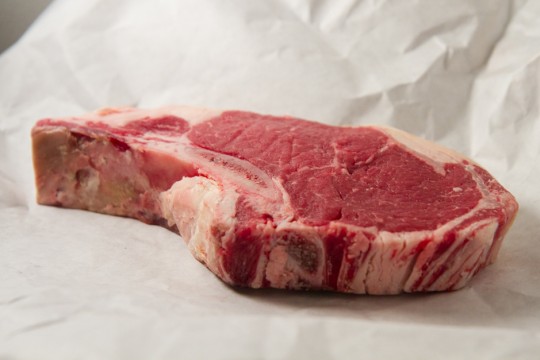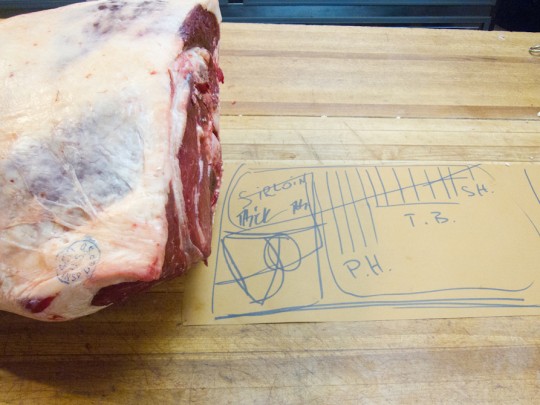Brad keeps asking me when I’m going to write more about my recent butchery workshop. He thinks those of you who are reading want to know more. But do you? I’ve found over the past few months as I’ve been nurturing an interest in learning to cut up animals, that it’s a tricky subject to discuss. The most common question following my “so I’m going upstate to study butchery for a week” statement was “why would you want to do that?”

The thing about butchery is that it is a trade craft. You can’t learn it from a book, you need someone to teach it to you and it needs to be practiced. I grew up training to be a dancer, and dance is a lot like butchery in this sense. It is an art and its works are passed on from one dancer the next.
My friend Clymene, who is a member of the Elisa Monte Dance Company told me that many of the young dancers she meets now aren’t as interested in classic techniques or in joining the companies that perform traditional works. They just want to be on TV, or go on tour with a pop star. I’ve always thought it was a good thing that our culture has popularized dance again with the help of movies like Step Up (yes I’ve seen all 3, several times, and I still crush on Channing Tatum), but it’s important that there is always an up and coming generation of dancers like I once was – dreaming that one day, if you practiced and worked hard enough, you would be taught to dance a part in a piece like Alvin Ailey’s “Revelations” for audiences who want to experience a part of dance history and a work of art.
Are you wondering where I’m going with this? There aren’t a whole lot of butchers around these days. A craft that needs to be passed on doesn’t have many masters left. Seriously, when was the last time you visited a butcher? If the food-loving, thanks to celebrity chefs and the popularization of a “foodie” culture, generation that follows us eats like I hope they do – with concern for where their food comes from, and with a desire to support healthy local economies and the environment in doing so – there will need to be more butchers. We need more people who are trained in the craft of cutting up the animals we eat. And yes, this is what I want to learn to do.
We also need to encourage young people to go to the ballet.

Maybe you find this talk of animals and butchery as fascinating as I do, but a lot of people who eat meat don’t like to think about eating animals (in fact the folks at Fleisher’s told me that when they carry whole animal carcasses into the shop from the van out front, it’s not uncommon for parents to cover their children’s eyes). But it’s important to know where your food comes from. If you’re eating meat, you’re eating animals, and each and every one of them deserves a healthy life and a humane end. And if you’re going to eat animals, have the respect not to waste them. After all, they died so you could eat and live.
Unfortunately the commercial meat industry has devolved into a terrible cycle that is concerned with producing a supply that meets and demand and makes a profit with little regard for the lives of the animals that become their product. And we Americans eat a hell of a lot of meat. I won’t go into it here, but watch Food Inc. or read a book by Michael Pollan if you want to learn more. However, there are farmers who care for the animals they raise, there are slaughterhouses (yes, that pig had to be killed so its belly could be cut up, cured, smoked and fried for you to eat your bacon) that use humane practices in the handling and killing of animals, and there are butchers who make it their craft to cut up those animals so they can be your food. In the case of Fleisher’s and other sustainable butcher shops, they are dedicated to using the entire animal, flesh, bones, fat and all.
If more people support the individuals and businesses in the meat industry who are doing things right, healthy supply will grow to meet healthy demand. And healthy animals make healthy (and better tasting) food for the people who eat them.

So what did I learn at Meat Camp? Certainly more than I can relay in a blog post. After the first day during which we attended a pig slaughter and watched a demonstration on cutting down a whole side of pork, only four of us remained. In the days that followed we learned about everything from animal husbandry, slaughter, inspection and grading, to properly breaking down whole animals as meat. We got very “hands-on” with several pigs, lambs and chickens, and we watched the pros work on cows. Doing so includes an understanding of anatomy, knife skills, technique and a lot of practice.
I was fortunate to be the student of Hans Sebald, who is considered a Master butcher and is a highly respected former instructor at the CIA (that’s Culinary Institute of America, not a government agency). Hans was an encouraging teacher with more knowledge to share than I could hope to learn in a lifetime. He even took us to Walmart to talk about commercial meat processing, packaging and labels. The comparative tasting of industrial vs. responsibly raised meat that followed back at the shop was eye opening.
I’m currently seeking more opportunities to continue learning, and in the meantime I’m cooking and eating meat as I try new techniques and note recipes. Oh, and I just celebrated a birthday for which I was given this book and a meat grinder. Since then, Brad and I have also been taste testing a whole lot of sausage.
I’ll continue to share my knowledge and experience as I gain it. But first, how about a recipe for duck ragu?



Daughter Fish says:
I’m glad you’re embracing this new passion and are going to share it with us. I absolutely agree that if we’re going to eat meat, we can’t shy away from the process that gets it to our table. I always felt this way fishing on my dad’s boat…although I do think it’s easier to kill a fish than a pig. Looking forward to reading more!
Heather says:
Thanks Christine, just call me Mrs. Gung Ho! I’m a lucky lady to have so many supportive friends.
More to come for sure, time to get excited about connecting the meat on our plates to its source.
TJ says:
Heather,
Awesome blog post. I’m reliving all those great memories from that week! -TJ
Beth Sugarman says:
Another great book on the subject is ‘My Year of Meats’…I forget the author. But talk about why be humane about the whole thing, read this book!
So great to hear from you, Hea, and what’s this about moving to the west coast?
Much love to you and Brad,
B.